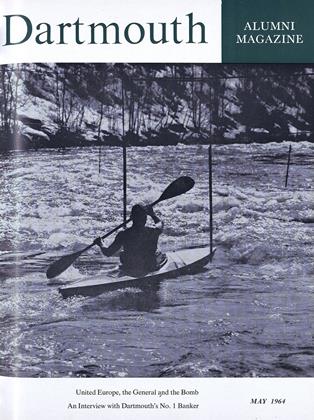MEXICO, if we are to believe travel folders, is a land too exciting, too beautiful to miss. Her Aztec lore, her matchless scenery, the ingenuous charm of her people, all these and more entice the most seasoned of tourists.
For a special group of Dartmouth students this summer Mexico does indeed beckon, but for reasons you won't find in a travel brochure. This is the age of the Peace Corps and the Alliance for Progress. Their spirit of generosity and responsibility has ignited the idealism latent in many young people. And this summer will prove just how practical and down to earth are the good intentions of the fifteen students who form the Dartmouth Project in Mexico.
It all began two years ago when Paul O'Connell, then a sophomore, from Worcester, Mass., joined a group of Yale students in building a small school in a remote village many miles from the capital. His enthusiasm, born of this experience, ignited the imaginations of two more students the following summer. Ted Howard '64 and Dick Corkey '65 spent their vacations working alongside the "Yalies" in the old city of Puebla. They lived in the homes of Mexican families, shared their food and their evening recreation, met with the young people of the neighborhood during after-work hours, listened, observed, and learned.
Corkey and Howard are not without their Dartmouth pride. Why couldn't there be a project organized and executed by Dartmouth students alone? On one of their rare excursions into Mexico City, they heard about, and subsequently met, a group of Jesuit fathers whose plans for aiding the people of a large slum area interested them. In the Tacuba section of Mexico City there is need of a social-service complex which would include a work center, a school and nursery, recreational facilities, and, hopefully, a clinic. In the case of most families of the area, both parents are forced to work; the hours are long, the jobs unskilled, the pay substandard. The resulting deprivations for the children are serious.
What, our two young men asked, could a dozen or more Dartmouth students do to help? The answer was immediate: build the nursery school. The architect and an engineer would supervise, the fathers of the children who would be educated there would work on the project in their spare time, no one would be paid for his labor, but the school could be ready for the fall of 1964. There was one more thing: would the Dartmouth students be able to raise enough money for the purchase of bricks, mortar, and tile? Ted and Dick winced. How much? Two thousand dollars. After a brief consideration, the uncertain reply was: we'll do our best.
Returning to college last fall, the two students approached the officers of Aquinas House, the Catholic Student Center on the campus. Peter Steck '64, the president, and his fellow officers readily agreed to sponsor and publicize the project. Using the chapel pulpit, the campus news media, and the art of conversation, the word went forth and, before long, meetings were inaugurated and plans took shape. Fifteen students caught fire and now set about to prepare for the venture. First of all, there was the problem of language. Without some knowledge of Spanish, communication would be halting and awkward, and this whole experiment in sharing would be crippled. Professor Francisco Ugarte of the Dartmouth mouth faculty offered his services and Monday evening classes began. The professor became especially helpful in another way: orienting the students' minds to Mexican psychology, to the customs, culture, and politics of the country.
The members of this project, "Dartmouth in Mexico," will live in ordinary Mexican homes, sharing meals and evening hours with their hosts. Extended conversations with the university students of the city will be possible, too. Mexico's national elections take place this summer and Latin American politics contrast fascinatingly with our own. Life should not be dull.
Financially, it will be a shoe-string operation for most of the students. Not only is each man sacrificing the earnings of summer employment, but he must draw from his savings for travel and living expenses. The Tucker Foundation, under Dean Unsworth, has thought well enough of the project to aid two students who otherwise could not afford to go. Aquinas House will make a contribution of three hundred dollars; this is money that was to be spent on hired work around the Catholic Center but which now will be done by the students themselves.
While it is true that the Tacuba project is under the direction of the Jesuits, and that the Dartmouth men center their campus operations at Aquinas House, membership in the group includes students of varying religious faiths. The Peace Corps and the Alliance for Progress, the work of the United Nations, and the social encyclicals of Pope John, not to mention the College's unequivocal support for international projects and studies, have achieved by their unwitting conspiracy, more than one concrete result on the Dartmouth campus. This "sojourn in Mexico" is a good example.
Student construction scene in Mexico that will be repeated this summer.
Student members of "Project Mexico" with Father Ferrick at Aquinas House.
 View Full Issue
View Full Issue
More From This Issue
-
 Feature
FeatureUNITED EUROPE, THE GENERAL AND THE BOMB
May 1964 By HENRY W. EHRMANN, -
 Feature
FeatureDARTMOUTH'S NO. 1 BANKER
May 1964 By DERO A. SAUNDERS '35, -
 Feature
FeatureA New Strategy of Liberal Learning
May 1964 -
 Article
ArticleTHE UNDERGRADUATE CHAIR
May 1964 By DAVE BOLDT '63 -
 Class Notes
Class Notes1936
May 1964 By BARRY C. SULLIVAN, GILBERT BALKAM -
 Class Notes
Class Notes1922
May 1964 By LEONARD E. MORRISSEY, CARTER H. HOYT








